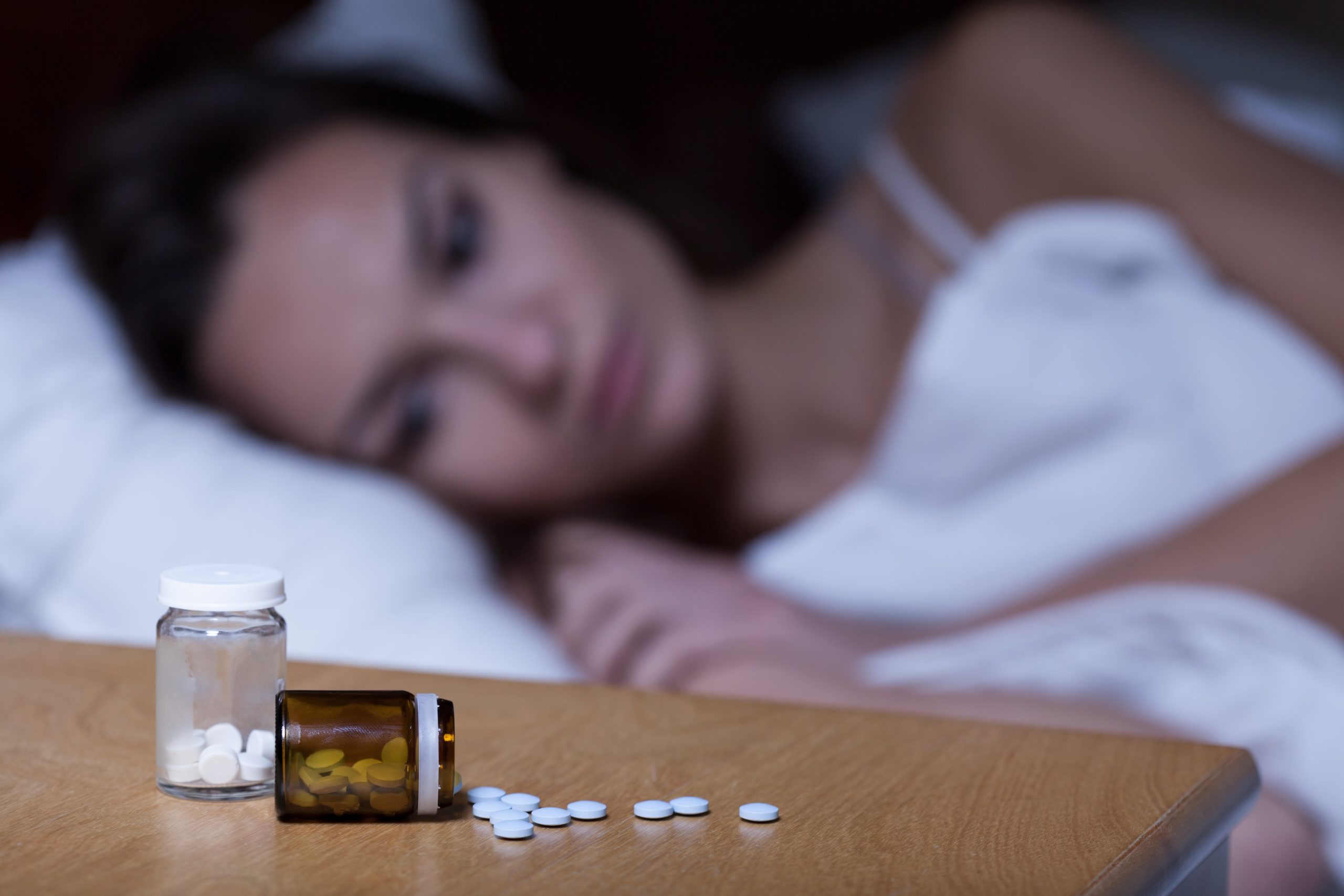Many people rely on Lunesta, Ambien, Ambien CR, Sonata, and other brands of sleeping pills to fall asleep fast and remain asleep when they have chronic insomnia. However, reliance on sleeping pills can develop into dependence and eventual addiction. As such, when you want to stop using them, you often experience different withdrawal symptoms of sleeping pills.
How Are Sleeping Pills Addictive?
Even though sleeping pills fall into their own class of sedatives, they have some similarities to benzodiazepines (benzos). For example, both types of drugs affect the GABA neurotransmitters in the brain to help people relax.
As a result, sleeping pills’ effects are fast-acting. People will start to feel drowsy in about a half-hour or less. The calming sensations and ability to fall asleep easier become very enticing for people with insomnia.
However, the body does start to build a tolerance to the drugs from continued use. Therefore, some people can begin to self-medicate and take higher doses to experience the sensations they have grown accustomed to feeling.
It is essential to remember that while the body develops a tolerance to sleeping pills, as long as they are taken as prescribed, they still do work, even though they do not feel like they are not doing anything.
Sleeping Pill Use Disorder
When sleeping pills are abused and taken in higher doses, used by someone without a prescription, or used in ways not prescribed, their effects can be more potent. People will still experience the same calming, drowsy effects as someone with insomnia. Yet, they also experience euphoric effects similar to benzos.
Another thing that makes sleeping pills addictive is when someone fights to fall asleep. As they do, they can enter a hallucinatory state.
Other effects that can be experienced when misusing sleeping pills can include:
- Dizziness
- Problems concentrating
- Lightheadedness
- Reduced inhibitions
- Lowered stress and anxiety
- Loss of coordination
These effects can be further enhanced when combined with alcohol, marijuana, benzos, or other sedatives.
Side Effects of Sleeping Pills
Even though sleeping pills are meant for short-term use, many people get hooked on them. Plus, there are those who abuse sleeping pills recreationally and become addicted to them.
When sleeping pills are first used, the effects can be pleasurable and enjoyable. The brain even remembers these sensations as positive behaviors to reinforce using sleeping pills again. However, continued long-term use can result in many undesirable side effects.
For instance, you can develop a craving for sleeping pills even in the middle of the day. Some people even take smaller doses throughout the day to enjoy effects similar to an alcohol buzz and maintain it.
Other side effects one can experience are:
- Changes in appetite
- Headaches
- Dry mouth
- Weight loss or weight gain
- Constipation
- Generalized weakness
- Diarrhea
- Muscle soreness
- Flatulence
Unfortunately, the side effects may not be that severe. So, you may not even realize you have a sleeping pill addiction.
Another side effect some people have reported, even when taking sleeping pills as prescribed, is called parasomnia. This condition is where a person performs different tasks while they are sound asleep, such as:
- Cooking
- Cleaning
- Laundry
- Driving
- Sleep Walking
- Shopping
Upon waking, the person has no recollection of what they did or where they went.
Withdrawal Symptoms of Sleeping Pills
When the effects start to wear off, people can go through withdrawal. Initially, the withdrawal symptoms of sleeping pills will be very mild. You may experience a slight headache or feel a little groggy when you wake up.
However, the longer sleeping pills are used, the more intense withdrawal symptoms become. When the drugs wear off or your attempt to discontinue their use on your own, you could experience:
- Stomach cramping
- Nausea
- Vomiting
- Shakes
- Elevated blood pressure
- Nervousness
- Paranoia
- Panic attacks
- Rebound insomnia
- Anxiety
- Depression
- Weight gain or weight loss
- Muscle spasms
- Delirium
- Uncontrolled sweating
- Tremors
- Irritability
- Extreme cravings for sleeping pills
- Seizures
How to Safely Detox from Sleeping Pills
There are several effective options to safely detox and reduce the severity of withdrawal symptoms of sleeping pills. For example, supervised detox is highly effective because a medical professional assists with your detox. You could be slowly weaned off the pills and given other non-addictive medications to counteract withdrawal symptoms.
Most of the withdrawal symptoms of sleeping pills generally dissipate in two to four weeks, depending on how long you use sleeping pills and the extent of your misuse. However, cravings for sleeping pills can last much longer. So if you are experiencing cravings, you should consider some form of drug rehab treatment or counseling to avoid a relapse.
At-Home Sleeping Pill Detox in Beverly Hills, CA
You can minimize the withdrawal symptoms of sleeping pills with at-home detox treatment in Beverly Hills and the greater Los Angeles area with help from MD Home Detox. We offer concierge-level detox programs custom-tailored to your specific needs.
Best of all, you get to detox in the comfort of your home while under the supervision of one of our medical professionals. Additionally, we offer access to our extensive network of professionals if you decide you need rehab treatment or counseling to manage sleeping pill cravings better.
For more information about our at-home sleeping pill detox treatment or to start your detox treatment, please feel free to contact us today!

